#manchurian incident
Explore tagged Tumblr posts
Text
Isolationism: How Well Did this Work Out for You Last Time?
The beginning of Japanese aggression that contributed to the onset of World War II can be traced back to its expansionist policies in the early 1930s. This period marks a significant escalation in Japan’s military ambitions, deeply rooted in its desire for resource acquisition and regional dominance. The roots of this aggression can be traced to the Manchurian Incident of 1931, an event that…
#appeasement#global order#global powers#Great Depression#international community#intervention#invasion of China#isolationism#Japanese militarism#Manchurian Incident#military ambitions#Nanking#Neutrality Acts#Pacific aggression#Pearl Harbor#puppet state#regional dominance#resource acquisition#Southeast Asia#US neutrality#Western powers#World War I
1 note
·
View note
Text
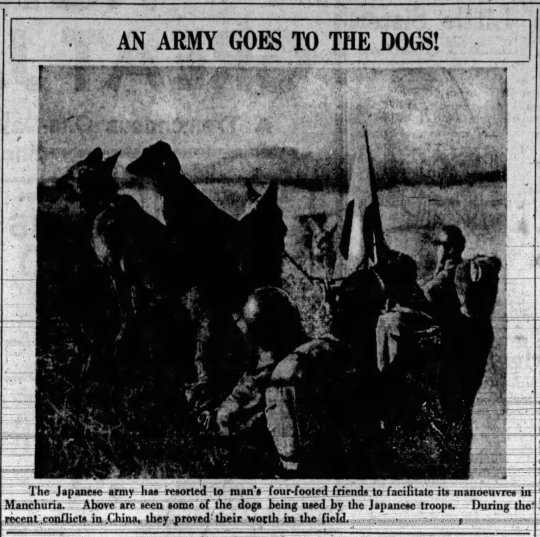
"AN ARMY GOES TO THE DOGS!" Hamilton Spectator. January 10, 1934. Page 7. ---- The Japanese army has resorted to man's four-footed friends to facilitate its manoeuvres in Manchuria. Above are seen some of the dogs being used by the Japanese troops. During the recent conflicts in China, they proved their worth in the field.
#manchukuo#manchuria#invasion of manchuria#manchurian incident#anti-japanese resistance in manchuria#kwantung army#imperial japanese army#interwar period#sino-japanese war#sino japanese war
1 note
·
View note
Text
What Movie Would You Like to See a Quality Updated Remake of?
Please suggest more if you have them.
51 notes
·
View notes
Text



Various photos of the IJA "Armored train of the Kamura group", which was directly involved in the Manchurian Incident. 1930s
17 notes
·
View notes
Note
(belatedly inspired by Japan 1941) - got a VOR ranking for Fumimaro Konoe?
Oh god I just effort-posted a fuck ton so this is just off the cuff for a very hard question okay? I am going to go with a D-tier here, that is my instinct. I think earlier PM's, like Wakatsuki during the Manchurian Incident in 1931, did have "agency" and failed to execute it in reigning in the growing independence and radicalism of the military. But after Manchuria, after the May 1932 incident, and certainly after 2-26 in 1936, the "Gekokujo" spirit and the military cliques were running the show. And Japan's war in China and growing drift into doom at America's hands is like the poster child for VOR analysis, right? No one could stop it. Every step in China Konoe was like "whats the plan guys??" and the army would be like "we kill more chinese? They will...run of manpower I guess???" but backing down wasn't possible because this is why the military spent half a decade murdering politicians, can't quit now, that would be cringe right? And of course Konoe was no pacifist, he spent half of 1938 cheering on the victories and rejecting peace options an only pivoted back when things got dire and the escalation had gone too far.
I respect him for not backing down at least when it came to the US. He legitimately, authentically tried to convince the Japanese factions that war with the US was Very Bad and endorsed more concessions than most were willing. It just never could have mattered.
11 notes
·
View notes
Text
some horny trans girl is going to post something that will activate a manchurian candidate sleeper agent's programming and cause an incident
28 notes
·
View notes
Text
Abraham Lincoln - Wikipedia
Abraham Lincoln had two vice presidents they looked very similar one of them left office March 4th 1865, and the second leaves the vice president's office April 15th 1865 and becomes president the first one left office after getting hit in the stomach with something so that was March 4th and already happened people say but no it wasn't public so people are wondering what the hell it could be and her son says that Trump is in the oval office all the time and he's up there and Dan Dave is down here in bed. He is here a lot of the time and her son didn't see him coming going today and Dan was seen by Jason and he is more or less unconscious and he might pass which raises the question what will happen then and He's listed as a brother and we think that Stan has our son drive him to the funeral cuz he doesn't want to go with Jason too much talk about it saying that he's really your brother is a fellow black man nope no no no no I don't have any money you're saying it to stand in Garth is a nightmare but you can get money to call dodos Paul don't know if he gets side work of some kind hopefully it's something that's not manual labor it doesn't involve getting exposed to deadly insects and he says oh there's a few jobs like that did he knows about one of them is writing stuff the other is getting money doing funny things simple things cosplay he's into cosplay he says he's got a really Kick-Ass costume he's trying to get the mask and he can help him do that and people might hire him because by the time August rolls around he's going to be muscular and you don't have to be huge but he'll be pretty pretty big and people be impressed and he'll have to lead up on Frank Castle hardcastle lines they're different than our son. Similar stuff though straightforward and like a policeman but a badass. This is happening and these things are real. Just as a recap in March March 4th exactly the day happened when Dan Dave was out and he's been seen around and not for long and he is not Vance. So the question is who gets shot trying to become vice president in the movie and we thought we explained it but yeah Dave Dan comes back and it is a conference no it was for this election and he put a chemical on the bullet to prevent it from healing. And Tommy F he is going to hit on him by most people for shooting at our son a lot of people want to get him a lot of Mac proper and Tommy F loses a lot of people these days. It's pretty much over for him but he goes ahead and does this anyways like the Trump people. And this incident with The Manchurian candidate has already happened and he shot
There's a lot happening here so we're going to print
Thor Freya
Olympus
Wow I see what you're saying this is different
Hera I'm his wife and the thing was the girlfriend and it is illegal but I knew about it
0 notes
Text
Sparks in the Ether; A True Story About a Pioneer Radioman by
MWSA Review Pending
Author's Synopsis
Navigate the rough seas of the 20th century with George Street, one of a handful of men who spread across the globe, connecting communities to the worldwide wireless telegraphy network. He encountered the Lindberghs and FDR, witnessed an assassination attempt on the Emperor of Japan, scooped the Manchurian Incident, and became ravaged by polio. Faced with financial ruin, foreign doctors, and immobility, he married his Russian mistress. Then, his family betrayed him.
Sparks in the Ether is the prequel to the award-winning book Pearl Harbor's Final Warning; A Man, A Message, and Paradise Lost.
Format(s) for review: Paper and Kindle
Review Genre: Nonfiction—Creative Nonfiction
Number of Pages: 283
Word Count: 62,254
0 notes
Text
This is utterly and laughably wrong.
Bucky did not use anything close to "lethal force" on the police. They are clearly shown to be not even remotely injured.
If he had wanted to kill them, Bucky would have picked up one of the discarded guns and mown them down without mercy.
Instead what does he do? He employs hand-to hand combat. He deflects bullets with his arms, and pushes their weapons out the way.

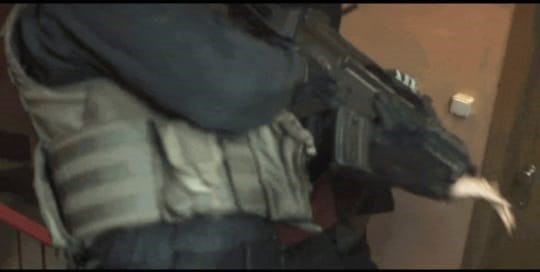
He punches and elbows them. None of this is "lethal force"
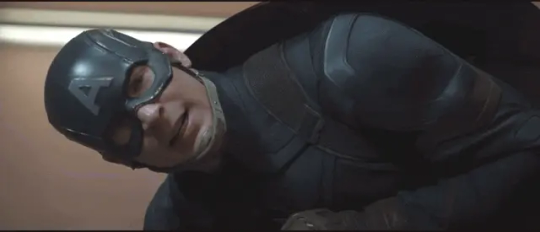
...and he pulled a guy off a bike.
Again, not lethal force. Not even close
That he had carried out dozens of missions for Hydra that would have required the ability to plan and adapt over the years.
He carried out targeted assassinations. These are very different military operations. They did not require planning. Only muscle memory.
Which, by the way is the same thing Natasha did: and yet Tony does not view her as an evil killer.
That he apparently had the ability NOT to follow orders if it was important enough to him.
No evidence for this. Unless you mean the one singular time he didn't kill Steve.. because Steve broke through his conditioning long enough for their connection to allow Bucky to make the first choice he had made for himself in 70 years.
The rest of the time, he's tortured if he so much as doesn't give a mission report. There was no reason to assume he was capable of defying orders.

That when they met in Siberia he was holding a gun on Tony right up until he decided that a known superhero wasn't gonna like, hold him legally responsible for his actions or anything crazy like that.
Context is important for what happened in Siberia. They are hunting Zemo: they are also in the bunker where there are 5 other super soldiers.
They are in a highly dangerous situation when they hear the elevator being activated. ANYBODY coudl have been in that elevator. Zemo, one of the other soldiers. For all they knew Zemo had accomplices.
That is why Bucky raised his gun. It was a natural, and quite sensible, defensive posture for a trained soldier.
Also it pays to remember the last time he saw Tony, Tony was attacking him. He was in the company of T'Challa who tried to rip Bucky's throat out (somethiing which Tony was fine with btw). For all Bucky knew, Tony had come to finish the job.
THAT is why he pointed his weapon at Tony. Until he proved himself to not be a threat.
Why should all of this add up to "Hero tragically mind controlled into these terrible actions as he watched helplessly from within his own body, hasn't he suffered enough?!?!
Hmmm, I dunno. Maybe becausde Tony knew all that was true. He had all that information. He called him Manchurian Candidate. He knew about mind control: he'd witnessed it first hand. Clint Barton tried to kill *HIM* under mind control.
I love the character, but that is the most gd BORING interpretation of the Winter Soldier possible, not to mention unsupported by what we are shown, much less what Tony knew.
Except it is *totally* supported by what we are shown. We are shown Bucky as a captive being repeatedly tortured. We are shown the horror and fear on his face when Zemo says his trigger words.
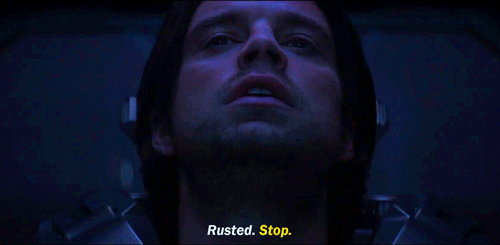
We are shown the guilt and shame when he is forced to kill. We are shown a guy trying not to kill, who doesn't even want to fight if he can help it.
He acts only defensively. He lived in Romania for 2 years without incident. He didn't join some mercenary band or become organized crime gang. We are not shown an evil pyschopath who enjoys killing. (If anything that's Tony...)
By the point we see hm we have seen it established that Mind Control victim are not in control of their actions. Which is why Tony fans use mind control as an excuse for his actions.
I get it. You love the male power fantasy of the Winter Soldier. Just like you love Mr "r*pe is funny" Stark, but that was and has never been Bucky's true nature and we are shown that multiple times. Right from the outset.
All this other nonsense is simply an attempt to justify Tony's attempted murder of the guy.
I always see Anti-Team Cap and Pro-Tony discuss how Tony attacking Bucky and Steve was justified and made sense, and yes, I totally agree with them, and regardless of the fact that Tony attacked Steve first because Steve was the one who lied and betrayed him, there is one thing that I haven’t seen be discussed much.
And it’s this scene right here:

Look at Tony’s face. Look at the shock and fear.
Bucky had no way of knowing that Tony could have protected himself, and he aimed right at Tony’s head. Look at the proximity of the weapon to Tony’s face. He could’ve blown his mind clear off if Tony wasn’t fast enough.
Tony had absolutely no way of knowing that Bucky “had changed” when literally just what? Days? Hours? Moments? ago, he could’ve died at Bucky’s hands.
That’s all I have to say.
#anti tony stark#bucky barnes#bucky barnes defense squad#captain america#ca:cw#“i only like the winter soldier”#hmmm why would that be?#the winter soldier#james buchanan barnes#bucky actually has morals and doesn't like to kill#unlike Tony r*pe joke Stark
959 notes
·
View notes
Text
“HERITAGE RAIDERS” PROVOKING CHINESE POPULATION

Fig. 1: Stolen Ming Dynasty gold coins
The gold crisis in Manchukuo has worsened significantly. Gold mines have been forced to shut down and workers have been laid off not because of insufficient demand. Instead, there is simply a lack of proper management and equipment to supply the workers with the tools they need to extract all the ores efficiently.
In an unexpected turn of events, many workers, mostly Japanese, have resorted to “heritage raiding” to meet gold quotas. Their actions range from stealing from abandoned mansionettes to even robbing prominent families for their historical artefacts to melt down the high amounts of gold contained in them.
These actis has angered the Chinese population in Manchuria and China, further reducing the already dwindling support of the Wang Jingwei government. Furthermore, Chinese partisans have used this incident to gain support, referencing the burning of the Summer Palace to spur resentment. Spies are reporting that insurgency cells, once dormant, have been receiving new recruits.
With gold extraction efforts in Manchuria already being threatened, sabotage and partisan action by insurgents could hinder the extraction and production of coal, iron ore & steel, food, and hydropower, hampering the war effort for all arms of the military. On the bright side, this may represent an opportunity for Zaibatsus to seize a greater portion of Manchurian industry.
0 notes
Text
Take a Train from Hiroshima to Nagasaki This Summer
As I was born in Hiroshima and my grandfather experienced the Hiroshima bombing at the age of 5 on the outskirts of the city, the Hiroshima bombing has been a crucial and relevant historical event for me. I visit the Hiroshima Peace Memorial Museum every chance I get, since childhood, and I offer a minute of silence on August 6 at 8:15 AM watching the Hiroshima Peace Memorial Ceremony on TV every year. So, I’ve grown up reading and hearing Hiroshima literature and relating myself to this horrendous historical event. Last winter I visited the newly-renovated peace museum when I visited my grandparents for New Year’s. But as I walked out of the museum it made me wonder: Why isn’t there any contextualization of the bombing? There is no mention of the Pacific War or anything before August 6. If you look at the webpage of The Hiroshima Peace Memorial Museum, the museum’s mission says: To convey to the world the horrors and inhumane nature of nuclear weapons and spread the message of “No More Hiroshimas” -- through A-bomb artifacts and testimonies of the atomic bomb survivors. NO wonder. Since their mission is dedicated to telling the tragedy of Hiroshima, there is no need to tell a single story about how the war led to the atomic bombing of Hiroshima.
Sheer curiosity took me to the webpage of the Nagasaki Atomic Bomb Museum because unfortunately I had never had a chance to pay a visit there and I wanted to know how Nagasaki does the same. But what I found was an interesting difference between the Hiroshima Peace Museum and the Nagasaki Atomic Bomb Museum. The Nagasaki Atomic Bomb Museum devotes one third of their exhibition to placing the atomic bombings of Hiroshima and Nagasaki not only in the context of Japanese history, but also of the history of nuclear weapons and their development. The war history exhibition, titled “The Road to the Atomic Bombing,” looks from the Manchurian Incident in 1931 to the Japan-China War, and follows up with the Pacific War to the defeat of Japan in 1945. They also have sections for the history of the atomic bomb development (especially the Manhattan Project), the nuclear arms race in the Cold War era, and the danger of testing the atomic bomb. It inlcudes the Daigo Fukuryumaru incident, where a Japanese fishing boat happened to encounter a hydrogen bomb test in Bikini Atoll in 1954, and the radiation damage to uranium miners in the US and the Soviet Union.
Reading through the websites of both museums about the atomic bombing, I came to realize that the two museums have different goals and approaches in their exhibitions. Hiroshima points out the tragedy of Hiroshima and is trying to create the discourse of “No More Hiroshimas”: Nuclear weapons are inhumane and must not be used again because they caused such atrocities in Hiroshima. Nagasaki, on the other hand, takes a comprehensive view. Nagasaki does tell what happened on August 9 as Hiroshima does: A-bomb artifacts, testimonies of Nagasaki survivors are there. But there are sections of exhibition dedicated to contextualizing the Nagasaki bombing in the context of Japanese military history or the history of nuclear power emphasize that Hiroshima and Nagasaki are a part of the nuclear tragedy for human beings as a whole. It resonates with Kyoko Hayashi’s (Nagasaki survivor) remark in From Trinity to Trinity when she visits the Trinity Site in New Mexico: “As soon as I started walking through the small passage within the fenced area led by a guide, my always-present awareness of being a victim disappeared from my mind.” When Hayashi visits the Trinity Site, she comes to feel compassion for Trinity as a survivor of the atomic bomb, beyond the differences of nations, enemy-friends, time, and distance.
I regret that I haven’t ever visited Nagasaki. I thought that the Hiroshima and Nagasaki experiences were similar, and the museums would be similar too. But I was wrong. They do carry different missions and messages, and it is important to visit both places and museums (and the Trinity Site as well) if you want to understand the atomic bombings more completely. A sad thing is that my perspective – visiting only one site (mostly Hiroshima) – is not rare for a lot of visitors, especially foreign visitors. In fact, Hiroshima attracts more visitors than Nagasaki, and the proportion of foreign visitors is bigger for the Hiroshima Peace Memorial Museum: Hiroshima has 1,522,453 visitors (434,838 foreign visitors) in 2018, but Nagasaki attracts 705,314 visitors (including 135,900 foreign visitors) in 2017. I understand that Hiroshima gains more attention because it was the first place that the atomic bomb was dropped on people. Nonetheless, it shouldn’t deprive Nagasaki of the opportunity to convey their message and understanding of the atomic bombings. So, I want to say, take a train from Hiroshima to Nagasaki with me! I’ve decided to visit Nagasaki this summer, as have been tempted to do since I now know what the Nagasaki Atomic Bomb Museum offers us. It’s a 4-hour train trip from Hiroshima to Nagasaki, and I promise that your trip to Nagasaki, combined with a visit to Hiroshima, will give you more perspectives on the history and round out your understanding of the atomic bombings.
A quote is from From Trinity to Trinity by Kyoko Hayashi and Eiko Otake (Translator)
「平和記念資料館、外国人入館者が6年連続過去最多」朝日新聞 2019.4.16
「原爆関連施設の入場者数が増加 核廃絶へ 機運高まり要因か」長崎新聞 2018.5.18
*I wrote this piece in the winter of 2020 and visited Nagasaki later.
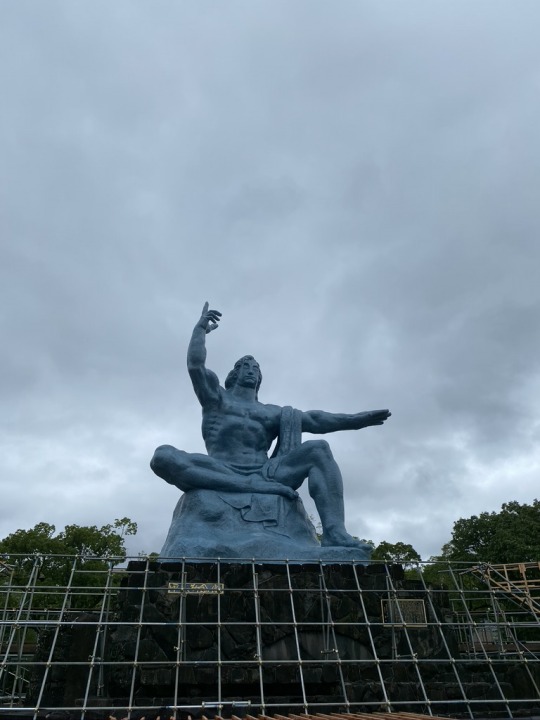
1 note
·
View note
Text
A poem by William Empson
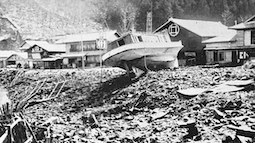
Aubade
Hours before dawn we were woken by the quake. My house was on a cliff. The thing could take Bookloads off shelves, break bottles in a row. Then the long pause and then the bigger shake. It seemed the best thing to be up and go. And far too large for my feet to step by. I hoped that various buildings were brought low. The heart of standing is you cannot fly. It seemed quite safe till she got up and dressed. The guarded tourist makes the guide the test. Then I said The Garden? Laughing she said No. Taxi for her and for me healthy rest. It seemed the best thing to be up and go. The language problem but you have to try. Some solid ground for lying could she show? The heart of standing is you cannot fly. None of these deaths were her point at all. The thing was that being woken he would bawl And finding her not in earshot he would know. I tried saying half an hour to pay this call. It seemed the best thing to be up and go. I slept, and blank as that I would yet lie. Till you have seen what a threat holds below, The heart of standing is you cannot fly. Tell me again about Europe and her pains, Who's tortured by the drought, who by the rains. Glut me with floods where only the swine can row Who cuts his throat and let him count his gains. It seemed the best thing to be up and go. A bedshift flight to Far Eastern sky. Only the same war on a stronger toe. The heart of standing is you cannot fly. Tell me more quickly what I lost by this, Or tell me with less drama what they miss Who call no die a god for a good throw, Who say after two aliens and one kiss It seemed the best thing to be up and go. But as to risings, I can tell you why. It is on contradiction that they grow. It seemed the best thing to be up and go. Up was the heartening and strong reply. The heart of standing is we cannot fly.

William Empson (1906-1984)
Listen to William Empson read his poem (20:48)
Author's Note: The same war in Tokyo then was the Manchurian Incident .... When I was in Japan, from 1931 to 1934, it was usual for the old hand in the English colony to warn the young man: don’t you go and marry a Japanese because we’re going to be at war with Japan within ten years; you'll have awful trouble if you marry a Japanese; and this is what the poem is about.
Image: The 1933 Sanriku earthquake occurred on the Sanriku coast of the Tōhoku region of Honshū, Japan on March 2 with a moment magnitude of 8.4.
0 notes
Text
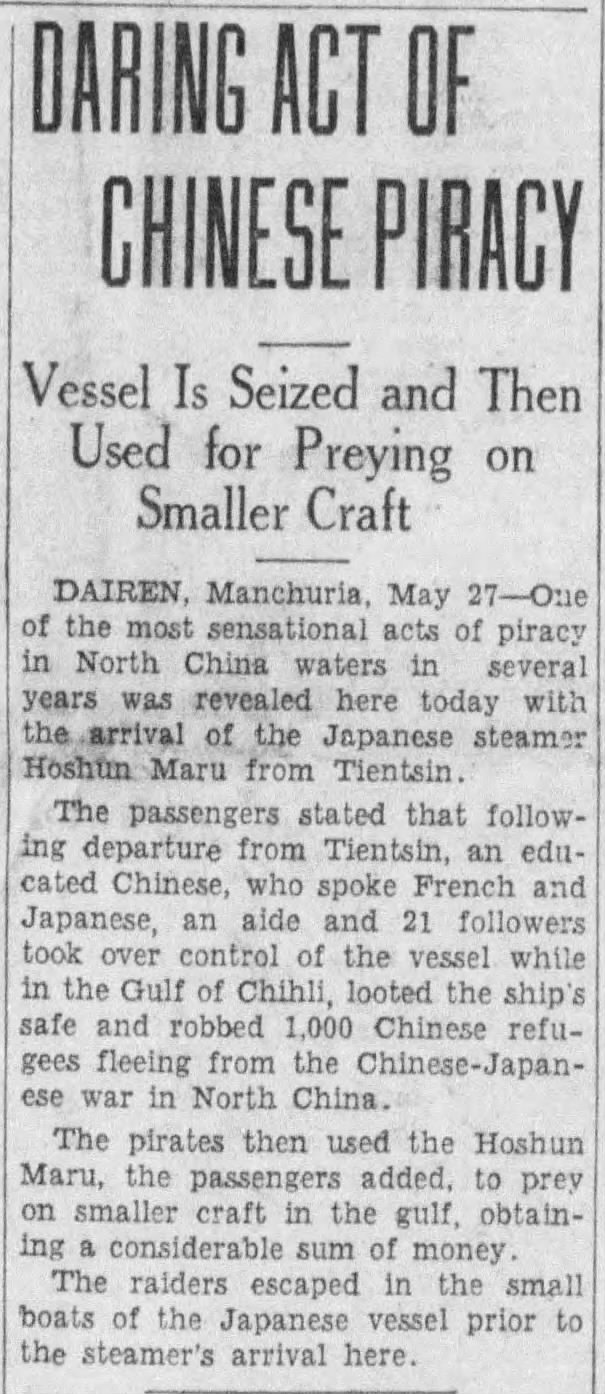
"DARING ACT OF CHINESE PIRACY," Kingston Whig-Standard. May 27, 1933. Page 1. ---- Vessel Is Seized and Then Used for Preying on Smaller Craft ---- DAIREN, Manchuria, May 27 - One of the most sensational acts of piracy in North China waters in several years was revealed here today with the arrival of the Japanese steamer Hoshun Maru from Tientsin.
The passengers stated that following departure from Tientsin, an educated Chinese, who spoke French and Japanese, an aide and 21 followers took over control of the vessel while in the Gulf of Chihli, looted the ship's safe and robbed 1,000 Chinese refugees fleeing from the Chinese-Japanese war in North China.
The pirates then used the Hoshun Maru, the passengers added, to prey on smaller craft in the gulf, obtaining a considerable sum of money.
The raiders escaped in the small boats of the Japanese vessel prior to the steamer's arrival here.
#dalian#tianjin#manchukuo#manchuria#manchurian incident#anti-japanese resistance in manchuria#piracy#steamer#japanese merchant marine#gulf of zhili#sino japanese war#pirates#chinese pirates
1 note
·
View note
Text
No Regrets for Our Youth
The movie sets the scene right away by playing somber music and having a wall of text that the audience member must read to understand the basis of the story. Because of prior knowledge of Japanese history, I was able to put into more context the reasons Kurosawa made this piece of art and its importance as well. It clearly set the tone as a political piece, but especially for that time, it was important for the public to understand what they had done. The events in question being the Kyoto University incident, also known as the Takigawa Incident (which is named after the professor that was fired, in the movie I believe it was her father who played that character but they did not use the same name), and the Manchurian Incident (an event where Japanese nationalists falsely accused China of bombing their railway and led to Japan invading Manchuria). Both of these events are crucial in understanding the context behind the movie. But moving on from that, it is clear that Yukie understands what is happening in the political scene, but similar to her love life, she chooses to turn away and just “freely” and enjoy herself. One of the shots that I found interesting was the one where Itokawa and Noge are both reaching for her hand, as it represents two views of Japan at the time. Because of that, we, as the audience, can draw the connection between Yukie and her personification of Japan itself.

The things that she experiences throughout the movie are similar to what the Japanese people went through in understanding the government’s actions. For example, when she discovered the body that was laying on the hill, I felt the illusion that she had made, crumbling before her eyes. Right before she saw the body, she talked about how she admired the sound of military maneuvers and the gunfire that they do. Similar to I Was Born But…, the image of the military as noble and just, rather than being seen in a realistic sense, is an important scene of realization that not only Yukie went through, but I can imagine the audience went through as they watched it for the first time. Kurosawa pans down from the shot of their bewildered faces onto the body and I interpreted that as their spirits falling as they saw it.

Yukie's image continues to fall as the years go on, trying to understand herself and the interactions between Noge and Itokawa, but ultimately ends up with Noge who still continues to be a leftist even after all that has happened to him. But that gets shattered when both she and Noge get arrested after being found as spies for attempting to “conspire” against the government, but for their freedom. Overall, this movie is an important piece that projects Japan in a different light than what some might be used to, as well as the history behind it which I think Kurosawa captured well.
0 notes
Text
Blog Post #3: No Regrets for Our Youth by Akira Kurosawa
This film was definitely one that wasn’t on my radar after watching a bunch of Kurosawa films already, but I thought it was pretty interesting to dig into some of his early works, especially those not relating to samurai (because there’s a lot of them). No Regrets for Our Youth follows our protagonist Yukie, who is raised by the professor of all the students that Yukie spends her time with. The film plays with time skips where at the beginning of the film, we see all the characters interacting with the student protests and fight for academic freedom following the Manchurian Incident, then jumps to different points in time of Japan battling with the war. The film was filled with a lot of allusions to real events that occurred in the 30s and 40s in Japan, and also showed how that shaped Yukie’s growth over the course of the film.
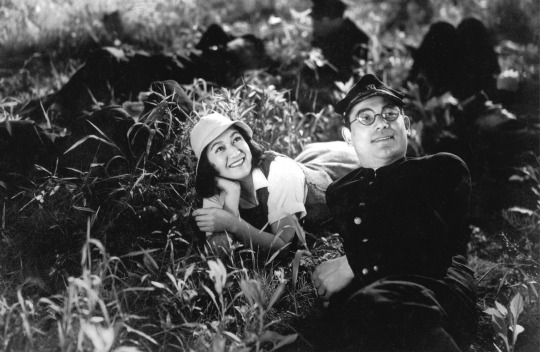
I, personally, was not the biggest fan of the film because I found it a little hard to follow along with all of the events that were occurring in the background. While we learned a little bit about the protests in Japan and talked about the Sino-Japanese War and the Manchurian Incident in Japanese Culture class, I found it took away from my overall enjoyment of the film because I wasn’t sure what to direct my focus on. While there are probably some people who disagree with me as while you could argue that the events regarding the Japanese socio-political environment set the stage for the film and served as the main setting for our characters, I found myself struggling to pick the important things to focus on: the characters and their development or how the story progressed in regards to the plot.
While I felt the overarching theme was powerful and explored well through Yukie, Noge, and Itokawa, I didn’t like how in-your-face it was. The message of living life without regrets is very powerful as, how Yukie described it, there’s a fine line between being alive and living. Yukie was conflicted regarding her true purpose in life and it was amazing to see her come through and affirm herself in the life that she wanted to live. It was also because of the characters around her that caused her to reach that conclusion because it appeared as if everyone was moving forward but she was stuck behind: Itokura became a prosecutor and Noge a very powerful and important figure in the leftist movement. This might be a personal thing, though, but I did not like how much it “title-dropped.” The overarching theme for the movie was shoved in your face and almost forced you to recognize that, versus the viewers picking up on their own interpretations. Some people may disagree with my opinion, I’m not always the biggest fan of what the director intended the film to be because at the end of the day, I’m watching for my enjoyment not for enjoying it the way the director intended it to be. All in all, it was a fun watch but not my favorite.
1 note
·
View note
Text
Mukden Mayhem: The Explosive Manchurian Crisis Has Begun
We find ourselves entrenched in the gripping "Manchuria Mystery Unfolds," an enigmatic chapter in the annals of international relations. The Mukden Incident, a seismic event in September 1931, continues to shroud itself in mystery as the Japanese Kwantung Army and Chinese rebels trade accusations with more intrigue than a detective novel. The Lytton Commission's ongoing investigation has yet to unveil the truth behind this explosion, and Manchuria remains ensnared in uncertainty. As the world watches, Japan's consolidation of power in the region advances, while international responses have been marked by criticism and caution. The U.S. and the U.K. have raised their voices in condemnation, while the USSR navigates a complex diplomatic dance. On February 16, 1932, Japan officially declared the state of Manchukuo, setting the stage for a complex diplomatic tableau. Delegates are reminded to abstain from consulting information beyond this date, as the intricate plot of this crisis continues to unfold.
0 notes